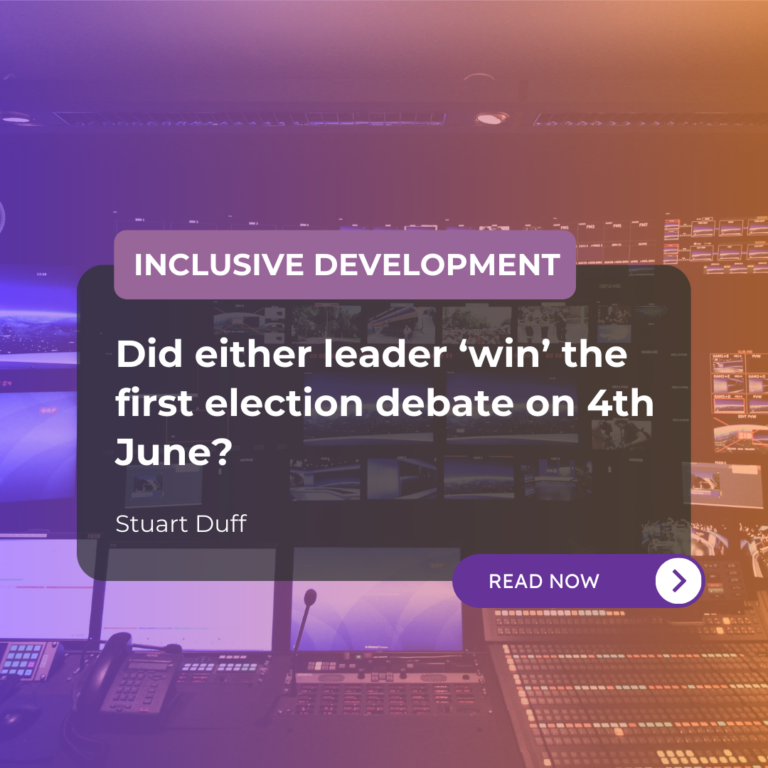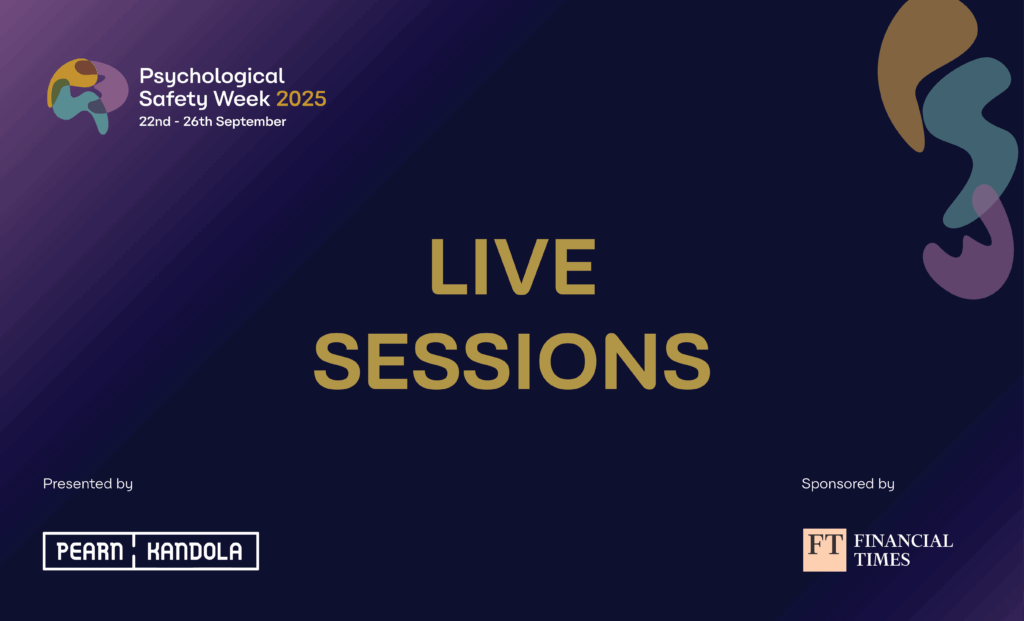Setting the scene for the first debate
Tuesday 4th June 2024 marked arguably the biggest moment of the election so far, with an estimated 9 million tuning in to the first televised debate between Prime Minister Rishi Sunak and leader of the opposition, Keir Starmer. Both leaders, ready to address both the studio audience and wider nation, would have been aware that one word or one comment could be repeated over the next four weeks.
Rishi Sunak is under pressure from his own party. They will be expecting a star turn from those disgruntled party members who may still be annoyed at Rishi’s decision to call the election so early. Coming into the debate leading in the polls, Keir Starmer is probably under less pressure, but perhaps feeling the need to play it safe and take a cautious approach – not to win the debate, but not to lose it either.
This shouldn’t stop either leader showing who they are as leaders – what they really stand for, who they care about and where they would want to take us should they win the election.
On the morning of the debate there was some great advice from John McTernan, Tony Blair’s former political secretary and advisor, who says, “just be natural” and avoid trying too hard to be witty… easier said than done? Let’s see.
Analysing the leadership performance of Rishi Sunak and Keir Starmer
This analysis is based on the live assessments that Business Psychologists provide during leadership development centres. A candidate will have the opportunity to lead a meeting and the coach will observe and record their interactions, providing a summary of feedback at the close of the meeting. We look at factors such as motivation, personality, style and impact in the meeting.
While the content of the debate – the policies and plans – will be important, what resonates equally with voters are the leadership qualities that Rishi Sunak and Keir Starmer display. For simplicity, and based on the format, we will focus on three clusters of leadership behaviour:
Capability to deliver results
Expresses plans and views with clarity and conviction, is decisive, emphasises commitment to deliver policies, is clear and consistent throughout the debate.
Positive personal impact
Tone and body language align to words, communicates in a trustworthy way, is authentic, genuine and caring, and listens carefully, considers other perspectives, responds considerately to questions.
Shares a clear and compelling vision of the future
Communicates a vision of a more positive way of life, reminds us of what is really important, is inclusive, compelling, specific and believable about what can be achieved in the future, has a vision that will appeal to a diverse audience.
At the close of the debate, we will rate each of the specific behaviours using a scale of:
(1) Weak or no evidence (2) Moderate (3) Strong and (4) Very strong, and draft a summary analysis.
Overall summary of the first election debate
Ultimately, neither candidate performed to the standards expected and outlined in our three leadership competencies. Both Sunak and Starmer consistently failed to take the opportunity to connect with the audience, instead opting for negative behaviours and tactics, such as talking across each other, raising voices and repeating the same points rather than developing the themes of the debate.
Neither candidate used the opportunity to share their personal vision, despite having party manifestos and missions to draw from. Instead, each candidate chose to attack, defend or undermine the other, rather than communicate the bigger picture opportunities to their wider audience.
Neither candidate seemed interested in answering the specific questions or challenges posed to them. They appeared to have scripted responses for every topic, so rather than being able to respond in the moment to the person raising the question, they instead resorted to monotonous, pre-approved messages. Even when given a yes/no ultimatum, both candidates felt it necessary to repeat previous statements without directly answering the question.
As a result, while both candidates appeared to try to demonstrate empathy with the questioner, their tone would often convey the exact opposite. The questioner’s own experiences over the past years simply became another chance to repeat their own mantra. This kind of evasive behaviour is not reflective of the positive, solution-focused style of leadership that will be required of the next government.
In summary, it was uninspiring, disconnected, and disrespectful behaviour that undermined both candidates’ leadership effectiveness. To be fair, this was the first of the debates, and the format of 45 seconds to respond to a question seemed restrictive. We can take into consideration the fact that both candidates would have been understandably anxious and still getting into their stride, so it will be interesting to see how each adapts their approach and progresses in further debates over the next four weeks.
Assessment of Leadership: Rishi Sunak – Debate #1
Competency scores:
- Capability to deliver results: 2 Moderate
- Positive personal impact: 1 Weak
- Shares a clear and compelling vision of the future: 1 Weak
Overall, Rishi Sunak underlined his ability to deliver results, but failed to demonstrate his capacity to connect with people and to communicate a clear, compelling plan for the future.
Sunak repeatedly stated his choice to “focus on the future” and went on to emphasise his own personal credibility and experience in handling the Covid pandemic furlough scheme and subsequent global challenges. By regularly stressing that “this is not about the past” and asking voters to look to the future, he undermined his credibility by frequently referring to the past when it suited him to do so. For any leader, inconsistency is not a good look.
Sunak also took the more direct and aggressive tone, perhaps wanting to emphasise that he is a leader who can stand up to others and get his point across. He consistently spoke over his opponent and, while this helped to reinforce his capability to deliver, it suggested that Sunak’s leadership style is principally task-focused and monotonous, rather than the engaging and flexible style required of an effective leader.
Sunak’s tone further undermined his ability to demonstrate humility, concern and empathy. On several occasions, there was a real need to connect with the audience and their questions, but there was little notable change in his style of communicating and connecting with them.
It was perhaps impossible to ignore Sunak’s quote of an estimated £2,000 tax hike that would be coming from a Labour government. This was a very direct challenge and seems to be based on unsubstantiated analysis, yet Sunak made the claim repeatedly. If transparency and trust are central to leadership, Sunak again undermined his leadership credentials. He relied on this tax argument throughout the debate but is unlikely to be able to do so in future debates.
Verdict: Rishi Sunak demonstrated that he was stronger on task delivery, capability and competence, but aloof and disconnected from the audience with very limited examples of his personal vision for the future.
Assessment of Leadership: Keir Starmer – Debate #1
- Capability to deliver results: 1 Weak
- Positive personal impact: 2 Moderate
- Shares a clear and compelling vision of the future: 2 Moderate
Overall, it was a very cautious and often robotic approach from Keir Starmer, which led to a muted and unengaging style of leadership, and a definite sense that he was more nervous than his opponent.
Starmer seemed very aware of the need to not be drawn on any specific arguments, taking his time to reply to some of the direct challenges from Sunak. This added to a vagueness in his responses and a lack of clarity about what he would do in the future, despite having the detail of Labour’s five key missions to share. Only when talking about the challenges faced by the NHS did he allow his guard to fall and start to show his personal passion, belief and meaning in the way he spoke.
Spontaneity is an important factor in whether or not we believe another person. We know when someone is genuinely reflecting on what they have heard and answering the points raised in a specific question. Much of Starmer’s dialogue felt carefully scripted and well-rehearsed, which got in the way of feeling that we were seeing the true person and leader.
When asked about his leadership on the world stage, Starmer responded that it would be his “solemn duty” if he was “humble enough to serve”. This is an illustration of Starmer wanting to play down the direct and authoritative style of recent leadership, instead hinting at a more reflective and more humble style of leadership under a Labour government in the future.
Starmer’s use of more direct language on issues that Labour have previously been criticised on was interesting. Important issues such as immigration and ‘stopping the boats’ have previously been a weakness in the Labour manifesto, so Starmer deliberately used words such as “vile” and “smash the gangs” to elevate perceptions of his approach. He wants to convey toughness, but his words say one thing, while his tone and body language say another.
Verdict: Keir Starmer showed that he was vague on capability and competence, but demonstrated higher levels of understanding, empathy and commitment to change.
At the close – who won?
Overall, while our assessment of both candidates in the debate showed a marginally stronger score from Starmer, neither was successful in demonstrating their leadership credentials. Ultimately, the scores were low for both candidates. If either leader was being assessed as part of one of our development centres? Neither would have received a recommendation that they are ready to take on a leadership role…
With less than a month to go before the election, it will be interesting to see how both leaders – and those of the smaller parties – will adapt their approach in the remaining debates.







